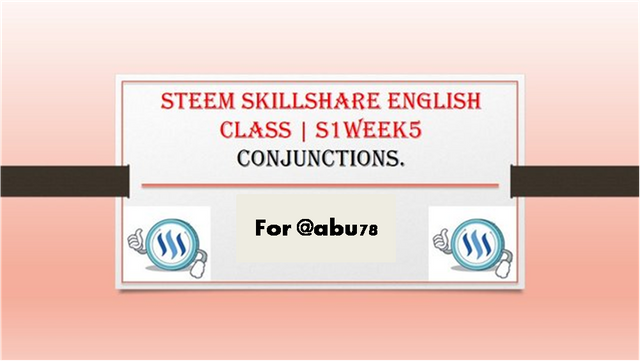Greetings to all!


1.- Briefly explain what you understand by Conjunction and give five examples in sentence.
Conjunctions are short words that allow you to join words, parts of sentences or sentences together, establishing a logical relationship between the connected elements.
In other words, a conjunction is capable of joining two sentence fragments or phrases, in order to build a third with total meaning and logical complementation, allowing the individual to express or enunciate an idea in a coherent way. The conjunction can be a word or a set of them, which can join words, phrases, propositions (simple sentences) and phrases.
Some of the most common conjunctions are: and, or, but, for, nor, as, since, yet, so, etc., but let's see it in some examples:
- We saw your sister but we didn’t see your brother.
- It is Jane’s birthday so she is having a party. Lots of people are coming, but not all of our friends have been invited.
- His son visited him a lot for he needed his family during that sad time.
- Although the traffic was bad, we arrived at the party on time. Jane was happy about the chocolates and flowers we gave her.
- When she put music on, people started dancing immediately. Since the music was so great, we danced all night long.

2.- Explain and give three examples each for the types of Conjunctions we learned.
2.1.- Coordinating Conjunctions:
These types of conjunctions join independent words, phrases and propositions. With them, short, choppy sentences can be joined into fuller lines. There are seven of these types of conjunctions, and they are easy to remember by applying the acronym "FANBOYS":
For - Explains reason or purpose (just like "because")
And - Adds one thing to another
Nor - Used to present an alternative negative idea to an already stated negative idea
But - Shows contrast
Or - Presents an alternative or a choice
Yet - Introduces a contrasting idea that follows the preceding idea logically
So - Indicates effect, result or consequence
It is important to indicate that a comma must be placed before conjunction to link two sentences. It must also be remembered that this type of conjunctions always link similar elements, that is, subject and subject, verb phrase + verb phrase or sentence + sentence. For example:
- His son visited him a lot for he needed his family during that sad time.
- I usually go to the lake and watch those cute families of ducks.
- I don’t go to the park for the fresh air nor for the ducks; I just like jogging.
- Rugby is entertaining in winter, but it’s better in the heat of summer.
- What do you want to drink? Coffee or tea?
2.2.- Subordinating Conjunctions:
A subordinate conjunction always introduces a dependent proposition, linking it to an independent proposition. A dependent proposition is a group of words that cannot stand alone as a complete sentence, while an independent proposition, on the contrary, can be stand alone.
Unlike coordinate conjunctions, subordinate conjunctions can often appear first in a sentence. This is due to the nature of the relationship between the dependent and the independent proposition.
It is important to indicate the subordinate conjunctions are classified with respect to what they are used for, that is, time, cause, effect, condition, etc. Some of the most used conjunctions of this type are: Although, before, where, though, once, how, as, that, until, if, since, while, when, etc. Let's look at some sentences:
- Because of her, I learned how to start my own blog.
- Until you try, you’ll never know for sure.
- I give money to charity when I can.
- As I am not feeling well, I will not go to the dinner party.
- Life has been so different since I moved to London.
2.3.- Correlative Conjunctions
Correlative conjunctions are those that are used in pairs and go in different places in a sentence to make them work. These conjunctions work together and connect two of the same grammatical terms. So if a noun follows "both", then a noun must also follow "and". Those that are commonly combined are:
neither/ nor
not/ but
not only/ but also
both/ and
whether/ or
either/ or
Let's see some examples where we use this type of conjunction:
- I would pick either the blue or the purple sofa.
- She’s studying both English literature and art history.
- Why don’t you want to visit neither Venezuela or Colombia?
- I took not only the dinner table but also the Mary lamp.
- Not the fries for me, but definitely the cheeseburger.

Thankful for the opportunity to participate in this course that will help me improve my knowledge of the English language. Here is the link of the course:
#Club5050 - Steem Skillshare English Class | Season 1 | Week 5 | Conjunctions by @abu78
Greetings to the Steem Skillshare community moderator team (@steem.skillshare): @milakz, @daytona475, @arie.steem, @abu78, @ftz, @dwarrilow2002 and @jenesa.

#Club5050

Greetings and blessings!
15% of the rewards obtained in this post will go to @steem.skillshare to support the growth of the Steem Skillshare Community.
Thanks for your publications, please consider delegating, join the curation trail or set the beneficiary reward in order to get support from our curation trail
Downvoting a post can decrease pending rewards and make it less visible. Common reasons:
Submit
I am attached to the curation trail, and this post was set 15% for the @steem.skillshare, for community empowerment.
Greetings
Downvoting a post can decrease pending rewards and make it less visible. Common reasons:
Submit
Hi @yolvijrm
Thank you for participating in the English Grammar class
Below is your assessment score:
Comments:
Thank you for participating in the third lesson. You really did well.
But please take note of this,
Its suppose to be "nor" and not "or".
Downvoting a post can decrease pending rewards and make it less visible. Common reasons:
Submit